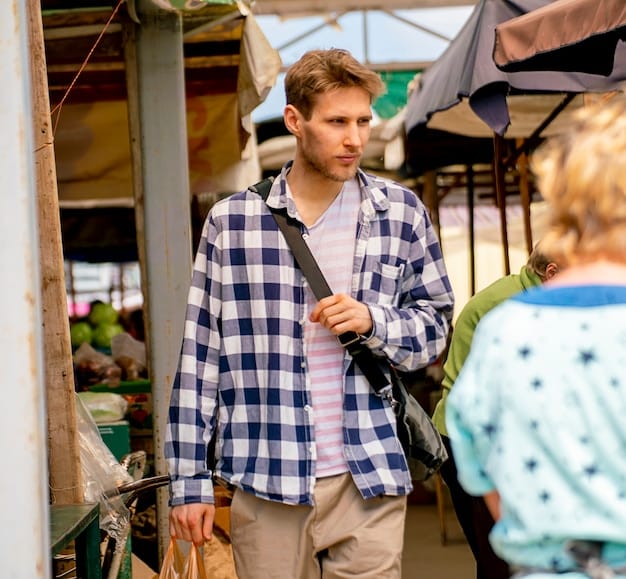How to Avoid Travel Scams: Stay Safe in 2025

How to Avoid Travel Scams: Insider Tips to Stay Safe and Secure in 2025 offers essential advice on recognizing and avoiding common travel scams, including fraudulent bookings, fake Wi-Fi hotspots, and deceptive tour operators, ensuring a secure and enjoyable travel experience.
Traveling in 2025 should be about exploration, not exploitation. Unfortunately, travel scams are becoming increasingly sophisticated, targeting unsuspecting tourists worldwide. This comprehensive guide, how to avoid travel scams: insider tips to stay safe and secure in 2025, provides you with the knowledge and tools to protect yourself and your money, ensuring a worry-free journey.
Understanding the Landscape of Travel Scams in 2025
The digital age has revolutionized travel, but it has also opened new avenues for fraudsters. Understanding the current trends in travel scams is the first step in protecting yourself. From online booking platforms to local tourist traps, scams are lurking in various forms.
Evolving Scam Tactics
Scammers are constantly devising new ways to deceive travelers. Be aware of tactics like fake travel agencies offering unbelievably low prices, phishing emails disguised as booking confirmations, and fraudulent Wi-Fi hotspots designed to steal your data.
The Impact of Technology
Technology plays a dual role. While it provides convenience, it also creates vulnerabilities. Scammers exploit weaknesses in online booking systems and utilize social media to spread misinformation and lure victims. Always verify the legitimacy of any online offer before proceeding.
- Always use secure, well-known booking platforms.
- Be skeptical of unsolicited emails offering travel deals.
- Use a VPN when connecting to public Wi-Fi.
Staying informed about these prevalent and emerging scams is crucial for a safe travel experience. By understanding how these scams operate, you can better equip yourself to recognize and avoid them.
Protecting Your Online Bookings and Financial Information
Online bookings are essential for modern travel, but they are also a prime target for scammers. Protecting your online bookings and financial information is paramount to avoiding fraud and ensuring a smooth trip. Here’s how to safeguard your details.
Secure Booking Practices
Always book through reputable websites and platforms. Look for secure connections (HTTPS) and verified reviews from other travelers. Avoid clicking on links from unsolicited emails or social media ads, as these can lead to phishing sites designed to steal your information.
Credit Card and Payment Safety
Use credit cards instead of debit cards for online transactions, as they offer better protection against fraud. Monitor your bank statements regularly for any unauthorized charges and report them immediately. Consider using a virtual credit card number for added security.

- Use strong, unique passwords for all your travel accounts.
- Enable two-factor authentication wherever possible.
- Be wary of websites asking for excessive personal information.
Protecting your financial information is vital for secure travel planning. By following these practices, you can minimize the risk of falling victim to online booking scams and ensure a stress-free journey.
Navigating Accommodation Scams: Hotels, Rentals, and More
Accommodation scams can ruin your travel plans before you even arrive. From fake hotel listings to misrepresented rental properties, knowing how to spot these scams is crucial. Here’s how to navigate accommodation bookings safely.
Verifying Hotel Legitimacy
Always verify the authenticity of a hotel by checking official websites and cross-referencing information from multiple sources. Be suspicious of deals that seem too good to be true, and always read reviews from other guests.
Rental Property Red Flags
When booking rental properties, use reputable platforms and thoroughly inspect the listing details. Look for inconsistencies, such as vague descriptions or lack of verified photos. Communicate directly with the property owner or manager and ask for additional information or proof of ownership.
- Never wire money or pay with cash for accommodation bookings.
- Be cautious of listings with unusually low prices or high-pressure sales tactics.
- Use Google Street View to verify the location and appearance of the property.
Being vigilant when booking accommodations can save you from significant financial loss and disappointment. Always double-check details and trust your instincts when something seems off.
Staying Safe from Tourist Traps: On-the-Ground Awareness
Tourist traps are common in popular destinations, designed to exploit unsuspecting visitors on the ground. Staying alert and aware of your surroundings is essential for avoiding these scams and enjoying your trip without being taken advantage of.
Recognizing Common Scams
Be aware of common scams like pickpockets, rigged games, and overpriced souvenirs. Avoid engaging with overly friendly strangers who approach you with unsolicited offers or assistance. Trust your intuition and don’t be afraid to say no.
Transportation and Taxi Scams
Always use official taxi stands or ride-sharing services to avoid inflated fares or detours. Agree on a price before starting the ride and ensure the meter is running. Be wary of taxi drivers who claim your hotel is closed or recommend alternative accommodations.

- Keep your valuables secure and out of sight.
- Avoid carrying large amounts of cash.
- Learn a few basic phrases in the local language to negotiate prices and ask for help.
Staying safe from tourist traps requires vigilance and common sense. By being aware of these tactics and taking proactive measures, you can minimize the risk of falling victim to scams and enjoy your travel experience to the fullest.
Using Technology to Ensure Your Security
Technology can be your ally in ensuring travel security. Utilizing the right apps, tools, and digital practices can significantly reduce your vulnerability to scams and enhance your overall travel experience.
Essential Security Apps
Download travel security apps that provide real-time alerts, safety tips, and emergency assistance. Apps like GeoSure and Smart Traveler can offer valuable information about local risks and potential threats.
VPNs and Secure Wi-Fi Practices
Using a Virtual Private Network (VPN) encrypts your internet connection, protecting your data from hackers on public Wi-Fi networks. Always connect to secure Wi-Fi and avoid conducting sensitive transactions on unprotected networks.
- Install antivirus software on your devices and keep it updated.
- Use a password manager to store and generate strong passwords.
- Back up your important data before you travel in case of theft or loss.
Leveraging technology effectively can provide an added layer of security during your travels. By using VPNs, security apps, and practicing safe digital habits, you can protect yourself from online threats and enjoy a more secure journey.
Travel Insurance and Emergency Preparedness
Travel insurance is a critical component of any travel plan, providing financial protection and assistance in case of unforeseen events. Being prepared for emergencies can make a significant difference in handling unexpected situations smoothly. Here’s how to ensure you’re covered.
Understanding Your Policy
Review your travel insurance policy to understand what it covers, including medical emergencies, trip cancellations, lost luggage, and theft. Ensure the policy provides adequate coverage for your destination and activities.
Emergency Contacts and Procedures
Keep a list of emergency contacts, including local embassies, hospitals, and your insurance provider. Familiarize yourself with local emergency procedures and have a plan in case of an accident or other crisis.
- Make copies of your passport, insurance documents, and other important information.
- Share your travel itinerary with a trusted friend or family member.
- Register with your embassy or consulate for up-to-date travel advisories.
Travel insurance and emergency preparedness are essential for a safe and secure travel experience. By understanding your policy and having a plan in place, you can travel with confidence and peace of mind.
| Key Point | Brief Description |
|---|---|
| 🔒 Secure Bookings | Use HTTPS and verified platforms. |
| 🛡️ VPN Usage | Protect data on public Wi-Fi. |
| 🧳 Travel Insurance | Ensure comprehensive coverage. |
| 🚕 Taxi Awareness | Use official stands, agree on fares. |
FAQ: Frequently Asked Questions About Travel Scams
▼
Common scams include fake booking sites, fraudulent tour operators, transportation scams, and phishing emails that mimic legitimate travel providers. Awareness is key to avoiding these pitfalls during your trip preparations.
▼
Use secure websites (HTTPS), book through reputable platforms, use credit cards for added protection, and enable two-factor authentication. Regularly monitor your bank statements to catch any unauthorized transactions immediately.
▼
Verify the property details on multiple sites, contact the property directly, check for reviews, and be wary of unusually low prices. Never send money without verifying the listing comprehensively beforehand.
▼
Be aware of your surroundings, avoid engaging with overly friendly strangers, use official transportation services, and keep your valuables secure. Trust your instincts and don’t hesitate to say no to unsolicited offers.
▼
Travel insurance provides protection against unexpected events such as medical emergencies, trip cancellations, lost luggage, and theft. Ensure your policy covers these aspects and is suitable for your destination and planned activities.
Conclusion
Staying safe and secure while traveling in 2025 requires vigilance, awareness, and the right tools. By understanding the evolving landscape of travel scams and implementing these insider tips, you can significantly reduce your risk and enjoy a worry-free adventure. Safe travels!





